Budapest-Bamako

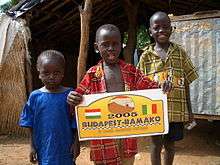




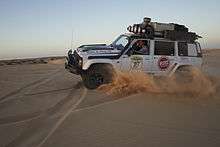

The Budapest-Bamako or Great African Run is a charity car race in Africa, and the largest amateur rally in the world.[1][2] It is a low-budget version of the Dakar Rally,[3] and goes from Budapest, Hungary to Bamako, Mali through the Sahara. It passes through Hungary, Austria or Slovenia, Italy, France, Spain, Morocco, Western Sahara, Mauritania and Mali.[4] The Budapest-Bamako was inspired by the Paris-Dakar Rally. There are few entry restrictions: as long as a vehicle is street legal, it can join the event. The event also raises money and supplies for local communities and charities in Mali.
History
The event was the brainchild of Hungarian internet entrepreneur and former radio shock jock Andrew G. Szabo, who wanted to give rally fans an option to the more expensive and stricter Dakar rally. After first envisioning a direct drive through the Sahara in Tunisia, Libya, Niger, Burkina Faso, and Mali he opted for a safer and more scenic route around the Western rim of Africa.
2005
On 26 December 2005, forty-two teams lined up in Budapest's Hősök tere for the inaugural run of the Budapest-Bamako. Two weeks later all but two teams arrived in Bamako's Place des Heroes (both meaning Heroes' Square in English). In 2007, over a hundred teams entered the race. Only ten of them did not cross the finish line.
2008
In 2008, over 400 people in 160 vehicles entered the Great African Run. Among the more unusual vehicles were a 1961 Velorex, an Ikarus 435 articulated bus, an ice cream truck, a Dacia, a Wartburg and a Polish Fiat 126. The 2008 run started amid security fears a week after the cancellation of the Dakar Rally.[5] Several French and Spanish teams dropped out of the Bamako citing fears of terror in Mauritania. The run was completed with few problems. The Mauritanian government assigned thousands of military and police officers to guard the event.
The touring category was lighter and simpler than in previous years. Teams in the touring category enjoyed events like the Annual Star Wars Theme Party on Planet Tatooine in Morocco, the Tropic of Cancer Party or the B2 Big Beach Party in Mauritania on a virgin beach, that has been named B2 Beach.
2009
In 2009, the racing and the touring categories were completely separated. The race featured a more demanding course. There were stricter time controls and more sophisticated geo-challenges.
2010
In 2010 edition of the rally was directed by four time Budapest-Bamako veterans, Andras Polgar and his brother Tamas. Less than 36 hours before the start, the Mauritanian and Mali stages were cancelled after the Hungarian Foreign Ministry warned the Polgars of potential terror threats in Mauritania.[6] That year, the rally ended in Agadir.[7] Despite the changes in the official finish line forty one teams and over 25 tons of aid arrived in Bamako without incident after on February 1, 2010.
After the 2010 run, the organization of the Budapest-Bamako reverted to the founder of the event with the promise of returning to Mali in 2011.[8]
2011
The 2011 rally ended successfully after teams completed one of the hardest editions of the rally. For the first time in its history the rally travelled through Senegal. Only 125 of the 160 teams finished and only 18 of the 40 race category teams crossed the finish line. [9]
2012
In 2012 the finish line was the capital Guinea-Bissau. For the first time in the history of the rally Bamako was not the end stage. Drivers had to travel through Senegal once again.[10]
2013
Organizers moved the finish line to Guinea-Bissau after a politically uncertain year in Mali. Hungary's anti-terror agency urged organizers to cancel because of the threat of kidnappings. The 2013 rally ended without incident. Out of the 142 teams only 89 crossed the finish line.[11]
2014
Days before the start of the 2014 edition, organizer Andrew G. Szabo announced that the 2015 run would be the last Budapest-Bamako. Amid the continuing political instability in Mali and Guinea-Bissau, the rally ended in Gambia. The capital, Banjul hosted the finish line ceremonies. The 2014 rally ended without incident. Out of the 145 teams, 105 finished the race on time.
2015
Three months before the start of the 2015 edition the Ministry Of Tourism in Mali ensured the Budapest-Bamako its continued supported in exchange for two more runs to Mali. Organizers announced that the rally will return to Bamako in 2016 and 2017 if the security climate permits. The 2015 rally started amid the West Africa Ebola crises of 2014/15.[12] Even though Mali become Ebola free just days before the rally started, the 2015 edition saw a record number of cancellations. Several members of the Mali Government welcomed the rally on February 1, 2015 in Bamako.[13] Out of the 124 departing teams 102 arrived in Mali. The event was held without incident. The competition was won by the Hungarian, Gumis Ember Team.
2016
Two months prior to the start, on Nov 20, 2015 Islamist militants took 170 people hostage in a hotel in Mali. 2015 Bamako hotel attack This was a strong deterrent once again for participants to cancel their participation in the 2016 run. Organizers and the Malian government reinforced security. Because of the large number of cancellations, breakdowns and continued fears only 68 teams finished out of the 120 who entered the rally. The competition was won by the Hungarian, Gumis Ember team again. Amid the security concerns, the organizer of the rally announced the Budapest-Bamako will become a bi-annual event.[14] During the intermediate years the team will produce a series of road rallies and adventure trips on the Bamako-Adventures umbrella. The first such rally, the Baja 4000 was announced prior to the start of the 2016 Budapest-Bamako. [15]
Some teams continue traveling independently after reaching Bamako, either driving back to Europe, or to other places in Africa.
Philosophy and rules
The guiding principle of the Budapest-Bamako is Anyone, By Anything, In Any Way.[16] There are no restrictions on the vehicles or individuals that can enter, and no set routes. Participants have to complete daily stages between Budapest and Bamako. It is not a timed event. Points are awarded for completing daily stages in certain time periods. In addition there are geocaching challenges along the way for additional points. If a team does not complete a stage, they are still in the race. Cars do not have to arrive at the finish line, only participants. Teams can participate in racing or touring categories.
Route
Usually, the race goes through the following countries from start to finish:
-
 Hungary
Hungary -
 Austria or
Austria or  Slovenia
Slovenia -
 Italy
Italy -
 France
France -
 Spain
Spain -
 Morocco
Morocco -
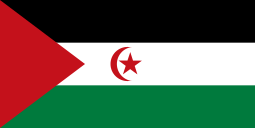 Western Sahara
Western Sahara -
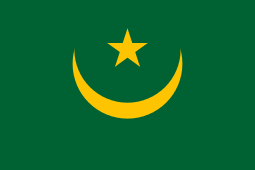 Mauritania
Mauritania -
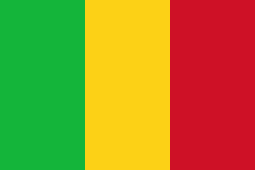 Mali
Mali -
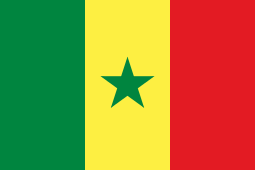 Senegal
Senegal -
 Guinea-Bissau
Guinea-Bissau
Nearly 8,000 kilometers are covered within 15 days. The race starts in Budapest, the Hungarian capital, and generally ends in Bamako, the capital of Mali.
Categories
Teams can enter in the competitive category where navigational points need to be reached and daily stages completed. It is a point race and not a timed event. In touring category teams travel at their own pace and there is no competition. In 2011 the Spirit category was added where old cars may enter without having to pay entry fees.
Charity
The Budapest–Bamako is primarily a charity event, that brings direct donations to communities in Mali and Mauritania. Many teams are delegated by firms as part of the corporate social responsibility program. In 2008, Budapest Bank donated an ambulance car after it was driven from Budapest to Bamako. The Bayer Red Cross donated a minivan for the Institute for the Blind in Bamako after it was driven from Europe.
- In 2005, money was raised for a Bamako orphanage.
- In 2007, participants adopted villages on route and delivered supplies to that community.
- In 2008, teams dug a well in the village of El Geddiya, donated medical equipment to a free clinic in a Bamako slum, including sterilization equipment and an incubator. Further educational gifts were given to schools in several Bamako districts.
- In 2009 over 700,000 Euros worth of aid was delivered to Africa. The British "Green Knights" brought solar panels and solar ovens to several Malian villages. A Dutch women's team delivered 230 bicycles to an organization called Women on Bikes. The NGO teaches women to ride bicycles so they can get jobs away from their villages.[17]
- In 2010 over 25 tons of aid was delivered to Mauritania and Mali. Members of the Norwegian Bamako team built a school in a remote Malian village named Kourmikoro. Aid supported several villages, hospital, orphanages, schools and clinics in both Mauritania and Mali.
- In 2011 800,000 Euros worth of aid was delivered. A new building was added to the school built in 2010 and a new well was dug in Diema, Mali. Members of the JCI team delivered 10,000 malaria nets to Mali and Senegal.
- In 2012 600,000 Euros worth of aid was delivered. Several ambulances were donated to Guinea-Bissau. A new school wing was built in Kourmikoro, Mali. Donations also supported the village of Sincem Boce, Guinea-Bissau, the orphanage and hospital in Bissau.
- In 2013 800,000 Euros worth of aid was delivered. A Danish team donated a fully functional fire engine to the mayor of Guinea-Bissau. Solar powered vaccination storage systems, computers, sewing machines and bicycles were also donated in Mauritania, Senegal and Guinea Bissau.[18]
- In 2014 750,000 Euros worth of aid was delivered. A Belgian team donated complete hospital equipment. The Belgian military flew a plane with 2000 kilograms of medical aid to Banjul to the finish line of the rally.
- In 2015 800,000 Euros worth of aid was delivered. A new wing was added to a school that the rally had built in 2010. The school system of the Cherifula slum of Bamako received the bulk of the aid.
- In 2016 600,000 Euros worth of aid was delivered. A radio station was built to promote gender equality in the village of Diema
The team that performs the most outstanding charity work receives the Mother Teresa Charity Award.
Television Coverage
Since 2007 British cable and satellite broadcaster, Travel Channel airs the Budapest To Bamako series.[19] Since 2008 the channel sends viewers to participate in the rally. In 2009 the series grew to five parts and followed the trials and tribulations of an all men and an all women team along the rally. In 2010 Hungarian national broadcaster RTL Klub broadcast the event daily. Since 2007 RTL Klub covers the event annually.
The Budapest-Bamako becomes bi-annual. Bamako Adventures
Citing organizational complexities and difficulties with making arrangements in Africa the organizers announced in Januar 2016, that the rally would be held every other year. During the intermediate years they'd organize a similar charity rally, road trip or community adventure to another part of the world. The first such event is planned for January 2017 to the Baja peninsula of Mexico.[20]
See also
- Baja 4000
- Bamako Adventures
- Plymouth-Banjul Challenge
- Charity rally
References
- ↑ [MarathonRally.com http://www.marathonrally.com/news/budapest_bamako_participants_gear_up_for_world_s_largest_amateur_rally.10898.0.html]
- ↑ [Race Dezert http://www.race-dezert.com/home/the-trans-saharan-budapest-bamako-rally-49536.html]
- ↑ [Radio Praha http://www.radio.cz/cz/clanek/75511]
- ↑ [Caboodle.hu "Archived copy". Archived from the original on 2011-07-21. Retrieved 2010-03-18.]
- ↑ [USA TODAY http://content.usatoday.com/topics/photo/Agadir/06oE8WV9Gvf2S/1]
- ↑ [MTI (Hungarian News Agency) "Archived copy". Archived from the original on 2010-01-16. Retrieved 2010-03-14.]
- ↑ [USA TODAY http://content.usatoday.com/topics/photo/Agadir/06oE8WV9Gvf2S/1]
- ↑ [Marathonrally.com http://www.marathonrally.com/news/budapest_bamako_waking_up_from_a_bad_dream_rally_will_return_in_2011.14928.0.html]
- ↑ [Marathonrally.com http://www.marathonrally.com/news/budapest_bamako_2011_sensational_finish_after_two_weeks_in_maili_africa.17759.0.html]
- ↑ [Marathonrally.com http://www.marathonrally.com/news/budapest_bamako_guinea_bissau_will_host_the_finish_line_of_the_2012_edition.18227.0.html]
- ↑ [Bloomberg.com http://www.bloomberg.com/news/2013-01-25/hungary-warns-of-terror-threat-on-budapest-bamako-race.html]
- ↑ [Hungary Today http://hungarytoday.hu/cikk/budapest-bamako-2015-worlds-biggest-amateur-rally-defies-terror-ebola-77762]
- ↑ [Maliweb http://www.maliweb.net/art-culture/10eme-edition-de-la-caravane-budapest-bamako-le-mali-un-pays-jamais-abandonne-779922.html]
- ↑ [Lloyd Mazgazin http://lloydmagazin.com/after-this-years-rally-the-budapest-bamako-becomes-biannual/]
- ↑ [Off Road Extreme http://www.offroadxtreme.com/news/video-baja-4000-amateur-rally/]
- ↑ [Daily News Hungary http://dailynewshungary.com/budapest-bamako-rally-the-story-of-raphael/]
- ↑ [Travel Channel http://www.travelchannel.co.uk/series-info.asp?series=Budapest+To+Bamako+2009&ID=1254]
- ↑ [Newstrack India http://www.newstrackindia.com/newsdetails/2013/01/26/181--Budapest-Bamako-rally-off-to-a-shaky-start-.html]
- ↑ [TV South Africa http://www.tvsa.co.za/default.asp?blogname=travelchannel&ArticleID=7841]
- ↑ [Lloyd Mazgazin http://lloydmagazin.com/after-this-years-rally-the-budapest-bamako-becomes-biannual/]
External links
- Budapest-Bamako Great African Run official website (English)
- Bamako Adventures
- Official Video Channel Of The Budapest-Bamako
- Article about the 2005 Run
- Budapest-Bamako Great African Run official live broadcasting
- Daily reports from the 2008 run
- Budapest-Bamako 2011 GPX files, maps and pictures.